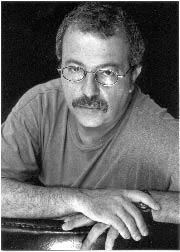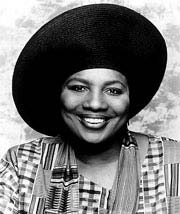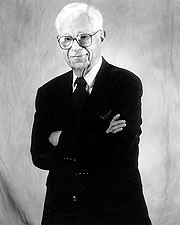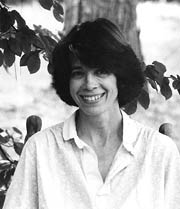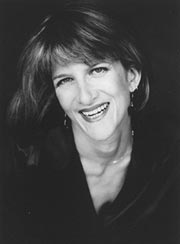|
|
 |  |
The History... |
|
|
|
The Hosts...
|
|
|
|
The Best of...
|

|
|
Our commentators are a vital part of All Things Considered — they help us listen for America. We find them through the books and articles they write. Sometimes, they find us; they send a letter or a sample tape that will capture our imagination. Public figures or neighborhood folks, commentators are there to add spice to our air. They take stands, bristle with bias, entertain, raise hackles, delight, spur listeners to consider repacking their intellectual baggage. They are the opinion pages of our radio magazine. A 30th-anniversary toast, then, to ATC commentators past and present. — Susan Stamberg, former ATC host, now Special Correspondent for Morning Edition. And now, a few words from some of ATC's most popular commentators:
It is impossible to recall in one paragraph, or in one sitting, or even in one night, the memorable things that have happened to me because someone recognized my voice from NPR. People with fine ears have clocked me on airplanes, in restaurants, and on the street -- usually after I had just confided something intimate, said something salty, or uttered an outright obscenity. The amazing thing is that I was rarely punched in the mouth, even when the "pouncers" disagreed with something I'd said on the air. I must confess that, for the most part, these NPR listeners liked my radio essays -- but they were civil even when they didn't. The greatest thing about having such an audience is the profoundly civilized manner in which they conduct their "argument with existence," as a poet once said. We like to call our listeners "thoughtful," but I would say "mindful" as well. Which doesn't mean that I don't get my share of the insanely passionate, now and then, but even these are more articulate than your run-of-the-mill wackos. I have made enough friends thanks to NPR to have a place to hide -- if I ever needed it -- in every city in the United States. I have also used some of my listeners' stories in ways that were not always nice. I am a writer, after all. This is my secret: I'm not half as nice as most of my listeners. I am bad. Very bad. Sorry.
Back to top
Vertamae Grosvenor:
The first time it happened, I was in Philadelphia. My train was delayed and I had a few hours. Fine; I decided to check my hand luggage so I could hop a bus and visit a cousin. When I asked a station employee if it was possible to check baggage for a few hours, the young man called me by name. I was stunned: “I’ve heard your commentaries on All Things Considered," he said, "and recognized your voice.” He invited me to have coffee with him; I explained I was going to visit my cousin, and he offered to drive me. I called my cousin, who was out of town, so we had coffee, and he interrogated me on NPR personalities, what they look like .... and not just on-air personalities! That is a remarkable thing about I discovered about NPR listeners: They listen! A few months ago, I took a taxi to work. When I gave the driver the address, he said, "Oh, you're going to NPR -- you work there?” “Yes.” “What’s your name?" I told him, and he said: “Never heard of you." As we approached the building, I said, “There is Ellen Weiss." I was glad I was at my destination, because the guy went wild: "You mean the executive producer of All Things Considered? I can't believe it!" And I can't believe -- or rather, didn't know -- that being on the radio would bring such wonderful and unusual encounters to my life.
Daniel Schorr:
In my memoir Staying Tuned, I say:
"In my days as an investigative reporter, my motto was, 'Find out what they're hiding and tell those who need to know.' In my more sedentary days, my motto has changed to, 'The people know a lot. Tell them what to make of it.'" We are deluged with information, and misinformation. Never have I seen a greater need for analysis. And nowhere have I found a better home for analysis than on All Things Considered. The audience reaction is most gratifying. Even criticism (yes, there is some) tends to be civil and has, on occasion, led me to change my mind. What I delight in doing is providing historical perspective for current events. At my age (soon 85), I enjoy a semi-monopoly on history, and it delights me to share it with All Things Considered and its audience.
It is easy to understand the appeal of All Things Considered (and National Public Radio in general) to the thinking mind. Where else can you find the carefully considered opinions of so many wise and intelligent people, so well expressed; and those seductive interviews that make you feel as if you are eavesdropping on a conversation between two very interesting people? But NPR has another appeal that is harder to describe, something that affects a different part of the mind. I mean those little passages that come from so far away straight to you as you sit alone in your car or in your kitchen -- an image, a phrase, a glimpse -- just a little thing that you don't forget. One morning about 10 years ago while I was stopped at the red light at the intersection of Hansell and Remington, I heard William Hamilton on Morning Edition describing the perfect apricot. Apricots won't grow in my hot climate, and I've never eaten a good one; by the time they get to us from California, they are mealy and tasteless. But ever since that morning, whenever I pause at that stoplight on Hansell Street, I smack my lips and taste that radio apricot. That must be the appeal of NPR to many listeners. You never know when you will receive a little gift -- something sweet and tart that melts in the mouth and lasts for years and years, like William Hamilton's perfect apricot.
The story begins in December 1990, when my friend Liz Lambert looked up from reading one of my essays in the Austin Chronicle, our town's alternative weekly. "Mare," she said in her West Texas way, "you should read these thangs of yers on NPR." "Yeah, Liz," I said, "and you should be president of the United States." But not two weeks later, I got a postcard from NPR Correspondent John Burnett, who had also been reading me in the Chronicle. He asked if I'd like to come over and record a couple of the essays, and offered to take the tape to Washington and see what people thought. I called him immediately, but not fast enough: His wife said he'd been sent to Iraq to cover Operation Desert Storm. Oh, great. Now the only thing between me and my big break was Saddam Hussein. John finally came home and recorded me in late spring of '91. I taped a piece about dealing with the Texas summer, and another about raising a child in a Jewish-Catholic intermarriage. Luckily my demo arrived during an early May heat wave in Washington and it went straight on the air. That was 10 years ago this week, and NPR listeners have been spared very little of what has happened to me in the interim. When my first husband committed suicide at the end of his struggle with AIDS and I talked about it on All Things Considered, I got 500 letters. I got only one when I complained about the census; and when we lost our guinea pig, nobody even sent a card. But that's okay: Y'all are still my family. And the moral of the story is: Liz for President! If just regular folks like me can be commentators on All Things Considered, I don't see why we shouldn't also be running the world.
|
Contents Copyright 2001, National Public Radio
